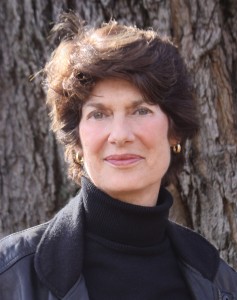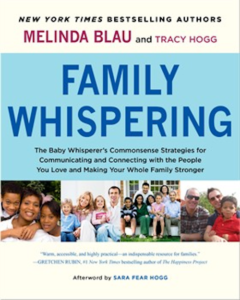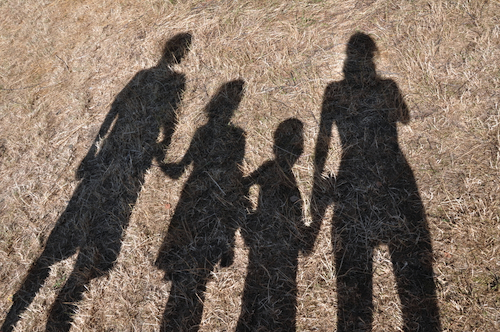
Before her untimely death in 2004, Tracy Hogg—aka the Baby Whisperer—and her longtime collaborator, journalist Melinda Blau, conceived a fourth book that would apply the commonsense principles of baby whispering to the “whole family.” This ground-breaking book, Family Whispering, explains why “family” is defined by much more than the relationship between parent and child. By widening the lens to focus on the family as an entity, Blau uses the Baby Whisperer philosophy to illuminate how the multiple bonds and interactions that unfold within a household of adults and children coalesce to form a larger family dynamic. By taking this wider perspective, she enables readers to see everyday challenges—such as sibling rivalry, communication, and time management—with fresh eyes.
Following is an excerpt from Family Whispering.


In our previous books, including Secrets of the Baby Whisperer, we wrote, “Baby whispering means tuning in, observing, listening, and understanding from the child’s perspective.” Now we’re widening the lens, asking you to look at the bigger picture. Take our child in that sentence, and replace it with whole family, and here’s what you get:
Family whispering means tuning in, observing, listening, and understanding from the whole family’s perspective.
This is a book that…asks you to shift your perspective from “parent-think” to “family-think” and to remember one of the key “secrets” of family whispering:
The whole family matters, not just the child(ren).
Family-think doesn’t necessarily contradict parent-think. It is another perspective, a more expansive one that encourages you to be family-focused instead of child-focused and to view yourself and your family as a unit. It’s a way of bettering your “familying” skills, so that you can pull together with your partner and children to create a safe place where kids and grown-ups feel as if they matter. You—the parents—are still in charge, and of course, you continue to care for your kids and guide them. But everyone is considered, and everyone—to the best of his or her age and ability—pitches in to make the family work. …
When Tracy emigrated from England in the late 1990s, she sensed that children were in charge. When a mother told her she was “following the baby” instead of establishing a structured routine, Tracy would exclaim, “But he’s a baby, darlin’! You need to be teaching him.” And the hovering…oh, the hovering! One mother told Tracy that she didn’t intend to put her baby down for the first three months (“just like they do in Bali”), to which Tracy replied, “But luv, we’re not in friggin’ Bali.”
As these babies grew into toddlers, their parents seemed desperate to shield them from sadness, mistakes, or failure. Mothers in Tracy’s Mommy and Me groups would sit behind their toddlers during a rousing rendition of “The Itsy Bitsy Spider.” It didn’t matter whether the children were actually singing—most don’t at that age—or just sitting there motionless; every one of those mothers would applaud and shout, “Good job!”…
After decades of jumping onto the self-esteem bandwagon, educators and psychologists have concluded that looking out for number one doesn’t make for healthy relationships or a good life. Being part of a loving family does. Of course, parents must care for and guide children; the adults should be in charge, protecting and monitoring, always striving to know their children and to keep them safe. But that’s not the same as positioning your children at the center of the universe. Quite the contrary. If we’re constantly micromanaging children’s every movement—tending, helping, hovering, suggesting, scheduling, reminding, interacting, demanding, not to mention praising them for sitting still—how can they learn to be part of a bigger something? If we don’t give them real roles in the family, how and when do they learn the skills they need to become independent? How can they learn to share and cooperate?
If you want your children to become competent and confident adults, don’t just parent them. “Family” them, too. They need to feel as if they matter not merely as individuals but as “stakeholders,” participants who have a vested interest in the success of a bigger entity. Being a member of a family and contributing to the common good are basic training for life. It teaches children and adults to see themselves as connected beings who have something valuable to give.
Think of [your family] as a co-op, an enterprise in which everyone respects, acknowledges, and gives to one another. Everyone has a stake in how the family operates, everyone matters, everyone makes choices, and everyone pitches in. Shifting the focus away from kids makes them want to contribute, because they know that they’re needed, and they know that they, too, have a stake in making the family better, stronger, and more solid. In turn, this benefits them as individuals, increasing their confidence and competence.
From Family Whispering: The Baby Whisperer’s Commonsense Strategies for Communication and Connecting with the People You Love and Making Your Whole Family Stronger, by Melinda Blau and Tracy Hogg, © February 2014, used by permission of Atria Books, a division of Simon & Schuster.
Related Article
Click here to see Rose’s tips for healthy and happy relationships



4 Comments